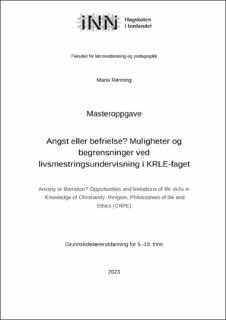| dc.contributor.advisor | | |
| dc.contributor.author | Rønning, Maria | |
| dc.date.accessioned | 2023-07-18T16:10:25Z | |
| dc.date.available | 2023-07-18T16:10:25Z | |
| dc.date.issued | 2023 | |
| dc.identifier | no.inn:inspera:136493732:37279642 | |
| dc.identifier.uri | https://hdl.handle.net/11250/3079781 | |
| dc.description.abstract | Temaet for denne masteroppgaven er livsmestring i KRLE. Studiens formål er å undersøke følgende problemstilling: Hvordan undervise i livsmestring i KRLE-faget på ungdomstrinnet? For å svare på problemstillingen har det blitt utført en kvalitativ dokumentanalyse av kapitlet om folkehelse og livsmestring i Overordnet del av læreplanen og av læreplanen i KRLE, med vekt på fagets relevans og sentrale verdier, kjerneelementer, kapitlet om folkehelse og livsmestring og kompetansemålene etter 10. trinn. Oppgaven er avgrenset til å ta for seg de delene av KRLE-faget som har med etisk refleksjon og filosofi å gjøre. Analysen bygger på en hermeneutisk tilnærming. Formålet med analysen er å undersøke hva styringsdokumentene sier om hva livsmestring er, og om de gir noen føringer for hvordan det skal undervises om temaet. Deretter presenteres to forslag til undervisningsmetoder som kan anvendes i livsmestringsundervisning i KRLE. Disse metodene er filosofisk samtale og dramatisering, og de er valgt basert på funnene fra dokumentanalysen. Tidligere forskning om livsmestringsundervisning i skolen viser at bruk av drama i skolen kan bidra til at elevene utvikler en trygg identitet, som er helt sentralt innenfor livsmestring i KRLE. Gjennom deltakelse i filosofisk samtale får elevene øvelse i refleksjon – en ferdighet som trekkes frem både i KRLE, men også i øvrige deler av læreplanverket. For å belyse problemstillingen ytterligere er følgende forskningsspørsmål benyttet: Hva blir elevenes utbytte av de ulike metodene?
Oppgavens teoretiske rammeverk består av litteratur knyttet til mestring, livsmestring, psykisk helse, anerkjennelse, sosiokulturelt læringssyn og filosofi. Studien presenterer også fire tidligere forskningsprosjekter som er aktuelle innenfor livsmestring og psykisk helse. Studiens funn viser at styringsdokumentene ikke gir noen føringer for hvordan det skal undervises i livsmestring. Kapitlene om folkehelse og livsmestring i Overordnet del og i KRLE sier hva livsmestring er, men overlater det til læreren å avgjøre hvordan det konkret skal undervises om temaet. | |
| dc.description.abstract | English title: Anxiety or liberation? Opportunities and limitations of life skills in Knowledge of Christianity, Religion, Philosophies of life and Ethics (CRPE)
The topic of this thesis is life skills in CRPE. The purpose of the study is to explore the following research question: How to teach life skills in the CRPE subject in lower-secondary school? In order to answer this question, it has been used a qualitative document analysis of the chapter about public health and life skills in the Core Curriculum and of the curriculum in CRPE, with an emphasis on the subject’s relevance and central values, core elements, the chapter about public health and life skills and the competence aims after 10th grade. This study has been limited to examining those parts of the CRPE curriculum in which ethical reflection and philosophy are central aspects. The analysis is based on a hermeneutic approach, aiming to investigate what the governing documents say about life skills education and if they provide any guidance on how to teach the topic. There has been presented two teaching methods that can be used in life skills education in CRPE: philosophical conversation and dramatization. These methods have been chosen based on the results from the document analysis. Previous research on life skills education in school shows that dramatization can contribute to the development of a secure identity, which is essential within life skills education in CRPE. Through participation in philosophical conversation, students get to practice reflection – a skill that is highlighted in both CRPE and other parts of the curriculum. To further illuminate the research question, the following question has been used: What is the outcome for the pupils using these two methods?
The theoretical framework of this thesis includes literature related to mastery, life skills, mental health, acknowledgement, socio-cultural learning and philosophy. The study also presents four previous research projects that examines mental health and life skills education. The results of this study indicate that the governing documents do not provide any guidance on how to teach life skills in education. The chapters about public health and life skills in the Core Curriculum and the curriculum in CRPE describe what life skills education is, but leave it up to the teacher to decide how to teach the topic. | |
| dc.language | nob | |
| dc.publisher | Inland Norway University | |
| dc.title | Angst eller befrielse? Muligheter og begrensninger ved livsmestringsundervisning i KRLE-faget | |
| dc.type | Master thesis | |
